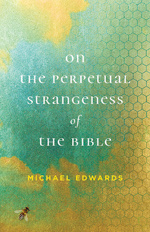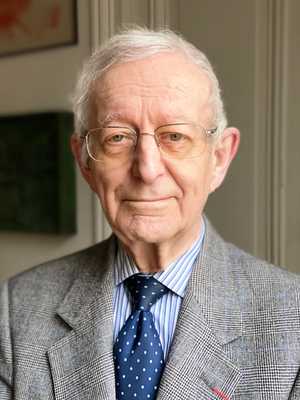Today, we are happy to bring you our conversation with Sir Michael Edwards, author of On the Perpetual Strangeness of the Bible.
What inspired you to write this book?
There were hundreds of things in the Bible that I didn’t understand and that I needed to explore, less by reading it than by listening to it, to the voice that speaks. I realized that the Bible was different, and that we often miss the depth of what it teaches because our usual habits of reading get in the way. By delving into the strangest and most astonishing passages, those where, faced with words inspired by God himself, we can feel out of our depth, I hoped that we might recover some of the power and the single-mindedness of the first Christians.
What did you learn and what are you hoping readers will learn from your book?
I learned a great deal by plunging in at the deep end. For one thing, to look closely at such passages is to discover a depth of thought that I hadn’t noticed before, and unsuspected links with other passages, as when the word “good” in an apparently quite ordinary sentence is seen to recall the “good” of the Creation in Genesis or the tree of the knowledge of “good” and evil. I was learning how better to read the Bible, and I sensed that every passage could be explored at length. I also appreciated far more the nearness of heaven according to Scripture, and the overwhelmingly intimate nature of the Christian’s relation to God, to Jesus – or, in other words, what it is to be a Christian.
What surprised you the most in the process of writing your book?
I was most surprised by the Book of Revelation. It had always puzzled me and had always left me wondering why it should have been composed in such a bizarre way. I think I discovered that God gave John a vision, not of the world as God Himself sees it, but of a kind of intermediate world of fabulous creatures and events, which shows what the world really is, in its horror and immense joy. The vision also seemed to take us out of our forward-moving time into a time where all times are one.
What’s your favorite anecdote from your book?
My favorite is something my wife pointed out, a verse in Proverbs: “My son, eat thou honey, because it is good”. It seems banal, if not trivial; it hardly compares, for profundity or urgency, with what is said in Isaiah or Psalms! And yet, if one listens to it along with Jonathan eating honey and his eyes being “enlightened”, and with Jesus eating a piece of honeycomb after the Resurrection (surely one of the most amazing and moving moments in Scripture: the resurrected Jesus sharing a meal on earth with his friends), one learns how spiritually enlightening it is to enjoy the simple pleasures of God’s creation.
What’s next?
I’m nearing the end of another book, Euro-Christianity, a more polemical work in which I try to show that, from after the death of the Apostles until now, we miss so much in Christianity from reading the Bible through European and Western eyes. It’s a further study of the salutary strangeness of the Biblical revelation. Having just published a book of poems, Another Art of Poetry and Doorstones, I’m some way into a new poetry book, probably to be called A Country for Old Men, and I’m gradually putting together another book of poems in French, to which I’ll give a title when I see what the whole looks like. I’ve also been asked by a very fine composer to write a libretto in French for an opera on Shakespeare’s King Lear. I’m glad it’s to be in French; I shouldn’t like to be rewriting the play in English!





